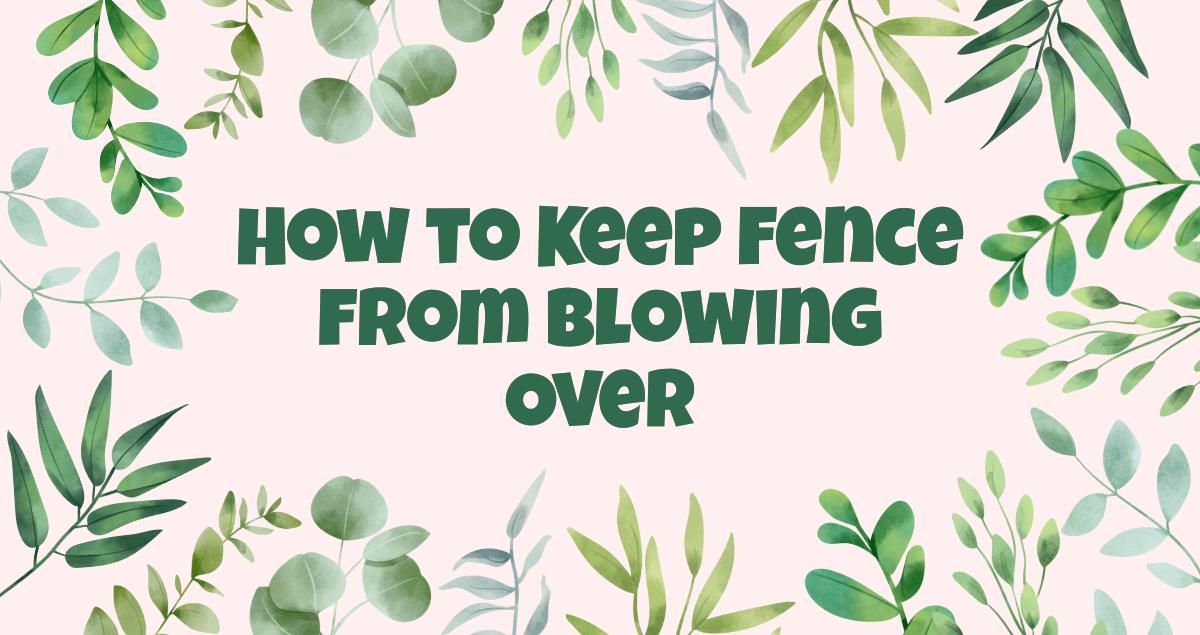Keeping your fence from blowing over can be a challenging task, especially if you live in an area with strong winds. A fence that is not properly secured can cause damage to your property, pose safety hazards, and ruin the aesthetic appeal of your home. In this article, we will discuss preventive measures and emergency solutions that can help you keep your fence standing strong.
Table of Content
How to Keep Fence from Blowing Over
To keep a fence from blowing over, ensure it is properly installed with sturdy posts set deep into the ground, use concrete for added stability, choose a design that allows wind to pass through, regularly maintain and repair any damage, and consider using windbreaks or planting trees to reduce wind exposure.
Understanding the Problem
Factors Contributing to Fence Damage
Several factors can contribute to fence damage, including wind speed, soil type, fence material, and installation quality. Wind speed is one of the most significant factors as it exerts a force on the fence that can cause it to lean or fall. The type of soil can also affect the stability of your fence, as soft or sandy soil may not provide enough support. The material of your fence can also play a role, as some materials are more wind-resistant than others. Additionally, the quality of installation can impact the longevity of your fence.
Consequences of Fence Damage
The consequences of fence damage can be costly, both financially and in terms of safety hazards. Repairing a damaged fence can be expensive, especially if the damage is severe. A fence that is not properly secured can also pose safety hazards, such as falling on people or pets. Lastly, a damaged fence can ruin the aesthetic appeal of your home, which can decrease the value of your property.
Preventive Measures
Choosing the Right Fence Material
Choosing the right fence material can make a significant difference in the stability of your fence. Some materials, such as vinyl and aluminum, are more wind-resistant than others, such as wood. If you live in an area with strong winds, it is recommended that you choose a fence material that can withstand the wind.
Proper Fence Installation
Proper fence installation is crucial to the longevity of your fence. Factors such as post depth, spacing, and bracing can impact the stability of your fence. It is important to ensure that your fence is installed correctly and that the posts are securely anchored in the ground. Additionally, adding bracing to your fence can provide extra support.
Regular Maintenance
Regular maintenance is essential to keeping your fence in good condition. Inspecting your fence regularly can help you identify any damage or areas that may need repair. Cleaning your fence can also help prevent damage, as dirt and debris can weaken the structure of your fence. Lastly, repairing any damage as soon as it is identified can help prevent further damage.
Emergency Solutions
Temporary Fixes
If your fence is damaged and needs immediate attention, there are several temporary fixes that you can use to stabilize it. Using sandbags, stakes, or guy wires can help provide extra support to your fence until it can be repaired.
Permanent Solutions
If your fence is severely damaged or has reached the end of its lifespan, replacing damaged parts or installing additional support structures can provide a permanent solution. Adding extra posts or bracing to your fence can help provide extra support and prevent future damage.
Conclusion
By understanding the factors contributing to fence damage, taking preventive measures, and having emergency solutions in place, you can keep your fence from blowing over and avoid the associated costs and safety hazards. Choosing the right fence material, proper installation, regular maintenance, and emergency solutions can all help ensure the longevity and stability of your fence.
Frequently Asked Questions
How do I keep wind from blowing my fence over?
To prevent wind from blowing your fence over, you can install sturdy posts that are properly anchored into the ground. Additionally, using concrete to secure the posts can provide extra stability. Regularly inspecting and maintaining your fence, such as repairing any loose boards or replacing damaged sections, can also help prevent it from being blown over by strong winds.
How do I keep my wood fence from blowing over?
To keep your wood fence from blowing over, make sure it is properly installed with sturdy posts and secure foundations. Applying a weather-resistant sealant or paint to the wood can help protect it from moisture and prolong its lifespan. Regularly inspecting and maintaining the fence, including tightening any loose screws or nails, can also help prevent it from being blown over by strong winds.
How do you secure a fence in high winds?
To secure a fence in high winds, you can reinforce it by adding additional support, such as diagonal braces or windbreaks. Using stronger materials, like metal posts instead of wooden ones, can also increase its resistance to strong winds. Regularly inspecting and maintaining the fence, ensuring all connections are tight and secure, can help prevent it from being damaged or blown over during high winds.
How do you secure a fence that is falling over?
If your fence is falling over, you can start by assessing the damage and identifying the cause. Repair or replace any broken or rotten posts, and reinforce them with concrete for added stability. Straighten and reattach any loose or leaning sections, and ensure all connections are secure. Regular maintenance and inspections can help prevent future issues and keep your fence secure.
How can I protect my fence from strong winds?
To protect your fence from strong winds, you can install windbreaks or barriers, such as planting shrubs or installing a mesh screen, to reduce the wind's force on the fence. Additionally, regularly inspecting and maintaining your fence, ensuring all components are secure and in good condition, can help prevent damage from strong winds. Using sturdy materials and proper installation techniques can also increase its resilience to strong winds.
What type of fence is best for windy areas?
In windy areas, fences made of materials like vinyl, metal, or composite tend to be more resistant to strong winds compared to wooden fences. These materials are more durable and less likely to warp or rot. Additionally, choosing a fence design with gaps or slats can allow wind to pass through, reducing its force on the fence and minimizing the risk of it being blown over.
Can I use concrete to secure my fence against wind?
Yes, using concrete can help secure your fence against wind. When installing the fence posts, dig the holes deep enough to accommodate a concrete base. After placing the posts, pour concrete around them, ensuring it reaches below the frost line for added stability. This will anchor the posts firmly in the ground and make your fence more resistant to strong winds.

